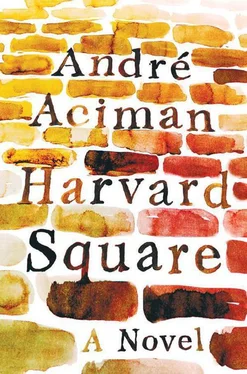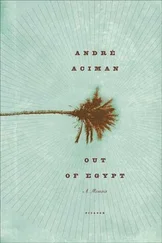An hour and a half later he was back. He was carrying a brown paper bag which he rushed into the kitchen because it was about to leak and emptied it in a salad bowl. More than a dozen chicken wings. Heavenly. From one of his other pockets he produced a small bottle of beer. Then came a string of petits sandwiches. “I told the waitress you were starving but couldn’t come.”
“But she doesn’t know me.”
“Short, Jewish nose, always lugging books — she knew exactly who you were. With her compliments.”
“And the books—?” I began, fearing the worst.
Suddenly, my heart sank. He had totally forgotten about the books!
“Right, the books—” he started. “I couldn’t find some of the ones you wanted… so I took out these instead.”
There he was being Harpo again. Out of numberless pockets in his faded army camouflage jacket, he produced six books.
“Not bad,” I said, as I looked at their titles. They were good books. When I looked in the inside cover, my heart sank again.
“But you forgot to check them out!”
“Well, yes, see, that was a bit hard. There were long lines, and they were all asking too many questions, and frankly ’appy hower was about to end, and I didn’t want to miss it. So I put the books in my pockets and decided to leave. I can assure you nobody saw.”
I was horrified. I was pleased.
“Now, I must let you work. Any books to lend me? I still can’t sleep at night.”
I let him borrow Sade, Maupassant, Balzac, and Stendhal.
“Bonne soirée.”
And he was gone.
I’D BEEN THINKING of the next morning’s meeting with Lloyd-Greville for so long that it had begun to seem unreal, as though lodged forever in the future. I decided to type up my notes, thinking that jotting down my ideas about Chaucer might help firm them up in my mind. But I was not prepared to see that I hardly nursed one interesting idea about Chaucer. He’d want to discuss Troilus and Criseyde or “The Knight’s Tale” whereas I’d much rather go on about “The Tale of Sir Thopas,” where Chaucer makes fun of himself as a totally feckless raconteur who is ultimately interrupted by the innkeeper and told to stop, because none of the pilgrims could stand his silly prattle. Chaucer the anti-narrator: there was gold in this idea. By 11:00 p.m. I realized that I had circled the wagons too many times to know what I had to say about Chaucer. I could already hear Lloyd-Greville: What, in fine, are your thoughts about “The Book of the Duchess,” sir? Lloyd-Greville had probably picked up the Gallic in fine from Henry James, about whom he was also an expert. My point was… well, you see, gentlemen —and suddenly I saw myself for who I was. I was, like the narrator of Notes from the Underground , an arrogant, jittery, posturing, paranoid, dysfunctional, capricious fop. Like him, I was all double-talk, even when I was alone and nobody was listening, even when I whispered things to myself that were truer than true — imponderable double-talk just the same.
I had no idea what my thoughts on “The Book of the Duchess” were going to be, but the more I wrote, the more I jotted down ideas, the more I seemed to depend on the page itself to tell me what I was trying to say. Trying to say? I didn’t know what I was trying to say until I’d said something that looked good enough for the Lloyd-Grevilles and Cherbakoffs of this world. If they thought it passed, then it passed for me. My ideas, however, were as transient and provisional on paper as I was at Harvard, in Cambridge, on this planet. I was, and my ideas were, like Kalaj himself, all talk. And the trouble was I couldn’t tell the difference between an idea and its malingering double, chatter.
By one o’clock in the morning the phone started to ring again. I picked it up without thinking. “I’m not asking you to come over. But can I come over?” It was Niloufar, she needed to speak to me.
“I am not alone,” I lied.
“Already found someone else? Bravo,” she said, and right away hung up on me. A few minutes later she called again. “I just want you to know you’re the worst person I’ve ever met. And I’ve known some very bad ones.”
“Thank you very much.” My turn to hang up.
She called again. “What I said was not true. You are the best person I’ve ever loved. Please come back. Or I’ll take a taxi and be at your door, begging.”
“I can’t talk.”
“Oh, I see, of course. Are you ready for tomorrow morning?”
“No, not yet,” I said, thinking she was changing the subject if only to maintain a semblance of composure but also, perhaps, to thwart whatever pleasure I was enjoying at the moment. I was wrong.
“Listen to me, Monsieur Chaucer screwing La Princesse de Clèves. I hope he tears you to pieces and exposes you for the shallow, bungling petit con you’ve always been, even, and especially, in bed. I curse you and your children if they’re unlucky enough to have you as a father. A curse on you — did you hear me? — a curse!” And out came a string of words in Farsi, tears, yelps, followed by an endless series of French words sobbed out of her lungs, as though she were talking not to me, not to her lover, but to her mother, pleading first, then cursing again, then apologizing for cursing, and cursing all over again. “I curse you.” As in some of her most passionate moments, she had turned to Old World-speak, and if my heart was racing as she kept heaping curses upon me and on the children of my children, it was because I too, like her, came from a world where curses, like blessings, like pledges, like all protestations of enduring love are, even when you don’t mean a word you’re saying, binding legal tender, the currency of the soul, because once spoken, they cannot be taken back, dispelled, or parleyed with; they will hunt you down, find you, and carry out their sentence.
I didn’t sleep that night. I couldn’t sleep. The meeting with Lloyd-Greville and the curses were enough to keep anyone up. I had crossed the line, stepped into the lepers’ colony of the damned; there was no redemption, no pardon. From here on, I’d live out the term of her curse. As for my comprehensives, they were cursed long before I’d met her, before Kalaj, before I’d even applied to Harvard — for this had started as a fantasy and, before I’d known it, the fantasy had crossed the line and wriggled its way into real life and was now outliving its time.
I went into the kitchen and decided to make the strongest coffee I had in the house. It would take ten minutes to brew a big cup of espresso — but I needed a break. I had five hours before me; the job could be finished by then. The stovetop espresso pot was dirty from the last time I’d brewed coffee in it, probably as far back as the month of May. My friend Frank had come over one evening to grumble about his girlfriend who wouldn’t stop complaining that he wasn’t doing something to avoid losing his hair. Claude, who was also present that evening, and who never liked to listen to Frank’s amorous bellyaches, interrupted, as he always did when Frank started about Nora, saying we needed to add Cointreau to spike the coffee. We brewed three cups, then brewed three more. Eventually, we turned to wine until Frank offered to cook something in my kitchen for the three of us. All I had were eggs and tomato sauce. Any cheese? he asked. Grated Kraft Parmesan. “I’ll make dinner,” he said, having located an unopened box of pasta.
I hated being alone in my apartment, though I also welcomed being alone again. But suddenly, and, once again, because of the coffee, I remembered the day when I’d returned from Widener Library the previous winter with several books and on walking into my apartment had found it all lit up with Frank and Nora setting my kitchen table for the three of us. “You forgot to lock the door, so we let ourselves in and brought dinner. Don’t you ever lock your door?” Nora had asked. “Not always. What would anyone want to steal?” I’d said. “True,” they’d agreed. The sofa, the bed, indeed, all my furniture, as everyone knew, had been lifted off the streets of Cambridge. Even my plates and my coffee mugs and director’s chairs were the legacy of friends of friends who had left Cambridge. Nothing belonged to me. I paid month-to-month rent, without a lease. The only key I used was the mailbox key. Frank had brought cooked lasagna that night and was busy reheating it. I loved them both that evening. This had never happened before, which is why stepping into my apartment and finding that people had lit up my place and made themselves at home had turned that evening into one of my happiest and most memorable days at Harvard. Lights, friendship, wine, lasagna, coffee.
Читать дальше












